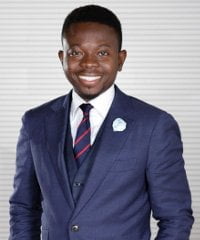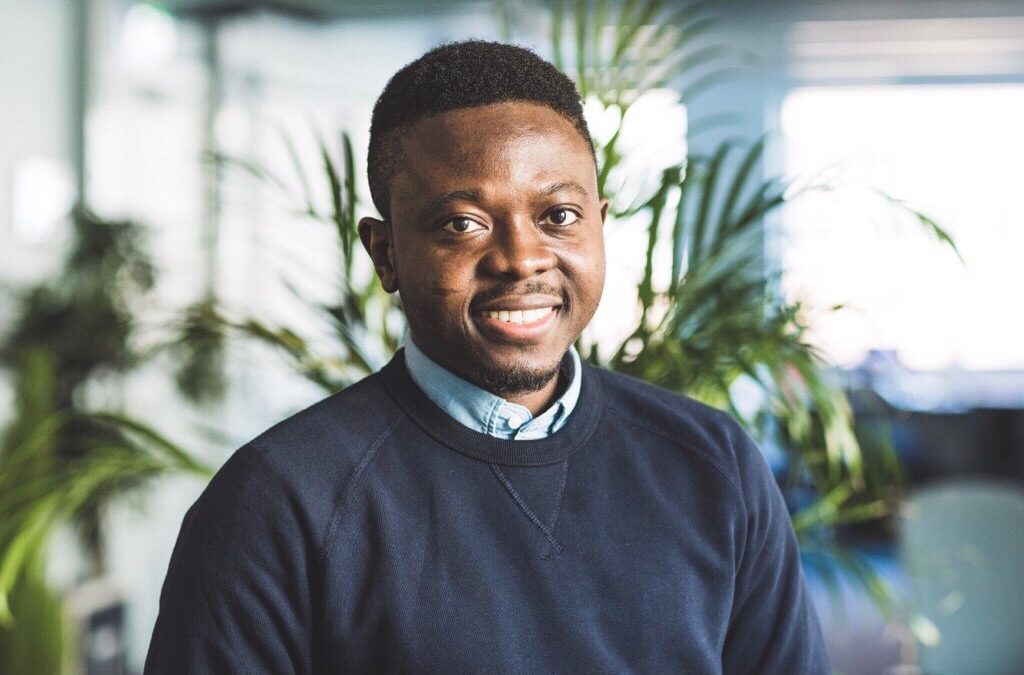The following is a conversation between Adebayo Alonge, founder and CEO of RxAll, and Denver Frederick, Host of The Business of Giving on AM 970 The Answer WNYM in New York City.
Denver: It is said the best entrepreneurs are those who have encountered the problem themselves. In the case of my next guest, he survived being in a coma for 21 days as a result of receiving fake medicine. And every year, tens of thousands of people across the world die because of these fake drugs. So he set out to do something about it, and has he ever! He is Adebayo Alonge, the Founder and CEO of RxAll.
Good evening, Adebayo, and welcome to The Business of Giving!

Adebayo Alonge © www.howwemadeitinafrica.com
Adebayo: Good evening. Thank you so much for having me on the show.
Denver: Let’s begin by having you tell us your story, the one that almost ended your life.
Adebayo: I was diagnosed with a very aggressive form of asthma about 15 years ago while I was growing up in Nigeria, and my dad was asked to buy me Ventolin tablets. I used a 4mg dose in the afternoon and another 4mg in the night, and, unfortunately, in the morning, I did not wake up. I was told that I was in a coma for about 21 days, during which the doctors vacuumed to keep fluids out of my lungs. After analyzing the pill, it was found that it had a very high dose of a very common sleeping agent. And so this is what had put me into a very deep sleep and led to all the complications further down the line.
In Africa, upwards of between 30%-50% of the medicines are falsified. In Southeast Asia, the numbers are more between 20%-30%, and in Latin America, the numbers are between 15%-20%. Overall, the global South is more adversely affected by this problem.
Denver: Give us a little bit more of the dimensions of this problem. What parts of the world is it most acute? And who are the main culprits?
Adebayo: There was a WHO study from 2017 that said about 10% of all the drugs in the world are falsified. Typically, falsified medicines are those drugs that lie about their composition, their identity, or their source. Now, the numbers are even bigger if we’re talking about substandard drugs. Substandard drugs are those medicines that are out of specifications, that don’t meet the required quality levels as defined by their monograph or preparation. In Africa, upwards of between 30%-50% of the medicines are falsified. In Southeast Asia, the numbers are more between 20%-30%, and in Latin America, the numbers are between 15%-20%. Overall, the global South is more adversely affected by this problem.
In terms of the culprits, most of the substandard medicines that go into Southeast Asia and Africa come primarily from India and China. Substandard medicines that go into South America and the United States typically come from Paraguay and Colombia. So these are the figures from the 2017 report from the WHO.
…there are over one million people who die every year because of substandard drugs, and so our goal is to help the regulators sanitize the supply chain system and make sure that people are protected, and that they’re only getting the best drugs that are possible within the healthcare system.
Denver: So you set out to create a solution, Adebayo. Tell us what it is and how it works.
Adebayo: We built out, myself and two of my other co-founders, while we were studying at Yale in 2015, we built out a platform known as RxAll. Primarily, it’s an AI platform that enables drug regulators to carry out real time drug quality checking, reporting, and surveillance of the supply chains so they can see countrywide-based real time the level of quality across different points of the supply chain. And so they’re able to actually recall bad and substandard drugs, and they’re able to pinpoint the culprits who are responsible for selling or bringing into the supply chain these substandard products. So, our solution a essentially covers, goes beyond just falsified drugs. We are also picking up very poor quality medications that previously nobody was actually picking out of the system.
And why our system is really very important is that in terms of poor-quality drugs in the supply chain, it leads to about $50 million in repeat therapy in Africa alone. And so helping regulators remove poor-quality medicines from the supply chain improves overall healthcare outcomes, improves or reduces overall costs of therapeutic treatments, and reduces the number of deaths. I mean there are over one million people who die every year because of substandard drugs, and so our goal is to help the regulators sanitize the supply chain system and make sure that people are protected, and that they’re only getting the best drugs that are possible within the healthcare system.
Denver: That’s absolutely incredible. How does that work, for instance, if you have an RxScanner, and you scan it over a particular pill, how are you able to detect the information as to what’s in that pill?
Adebayo: We built up a proprietary method that is able to read the molecular spectral fingerprint of a pill, and so the AI has memorized what a typical high-quality medicine fingerprint looks like within acceptable manufacturing variations. And so when a substandard product that has negative grade or has been poorly manufactured or has been falsified is scanned by our RxScanner, that fingerprint is sent into the Cloud where we have our AI compare it, analyze it to what it has memorized as the high quality fingerprint. And if it’s very different or out of the acceptable manufacturing bounds, which is usually the case with poor quality or falsified drugs, it picks that out and sends it back into the mobile app as a substandard drug, and also indicates in the mobile application the level of quality of that drug, and then immediately sends that information into the surveillance map where the drug regulator is able to see it as an alert on their system. They are able to pinpoint the GPS through the scan. They would have a sense of where the pharmacy is that had made that supply, and they would then compare it all with the other scans that have happened in the country. And if they see any repeated poor quality of a specific brand or the specific batch number, it can then actually do a real time recall across the country to remove that poor quality drug on the supply chain.
Denver: Very, very cool! What’s your business model? Is it from the sale of the scanners? Or the data you are able to collect? Or is it just a combination of things?
Adebayo: We sell primarily a subscription to the platform, and the subscription helps the regulators deploy the scanners across different testing points in the country. It also covers the cost for the scanning and the database build-out and the database management. And so all of the subscription access enables them to have access to the full platform and the data and analytics that is also created as a result of all of the scanning that’s taken place.
Denver: This work has been recognized in a variety of ways but perhaps most prominently when you guys were named the grand winner of The Hello Tomorrow Global Challenge, beating out 4,500 other deep tech companies. Congratulations on that!
Adebayo: Thank you so much.
Denver: What’s the impact of that been on the company?
Adebayo: It’s raised the profile of the company internationally, and so what it has led to directly is that we now have moved into South America, specifically in Colombia, working with local Colombian and Honduran… local partners there. We’ve also been able to get into Southeast Asia, now working out in Thailand and Myanmar, and also into East Africa, working with Ethiopia, Kenya, and Uganda. So, overall, it has helped raise our profile and helped us get more users across the world.
Denver: Finally, Adebayo, not that you don’t have your hands full with this, but are there any other ambitions you harbor in the medical field, or in the field of deep tech to promote social good?
Adebayo: Yes. Another area that I would definitely love to look into is the use of AI for healthcare diagnosis. So Africa has a severe deficit…or the developing world as a whole has a severe deficit of doctors. And what is possible is that if we have an AI system that can almost set up a doctor, we can implement that in a number of test locations, in rural parts of Africa, and then tying the AI’s recommendations to a human doctor in a city to speak out prescriptions and diagnosis in order to treat more patients. So, definitely, this is one area that I would definitely be very much interested in.
Another area which I’m looking into is actually what we call a pharmacy platform that helps to improve access to high-quality medicines for patients in rural areas. So using their mobile phones, they can easily find high-quality pharmaceuticals around them, interact with the pharmacies in the market network… social network system, get the primary diagnosis from the pharmacies, fill out their prescriptions and get their medicines without having to leave their homes. So, these are two applications that I’m really excited about and hopefully further down the line, I’ll be looking to explore.
Denver: Great stuff. Stay excited and stay ambitious. Adebayo Alonge, Founder and CEO of RxAll, I want to thank you so much for being here this evening. For listeners who want to learn more about this incredible work, tell us about your website, and what they’ll find there.
Adebayo: We are at www.rxall.net. On our website, you can contact us and reach out to us if you’re looking to be a partner, a distributor, or as a donor. More countries do need some support with donations to get the platform into more areas in the developing world, and you’d also find some details about the team, as well as the solution as well. We’re very happy to hear back from you and to connect with you as a partner.
Denver: Fantastic! Well, thanks, Adebayo. It was great to have you on the show.
Adebayo: Thank you so much.
The Business of Giving can be heard every Sunday evening between 6:00 p.m. and 7:00 p.m. Eastern on AM 970 The Answer in New York and on iHeartRadio. You can follow us @bizofgive on Twitter, @bizofgive on Instagram and at www.facebook.com/businessofgiving.

